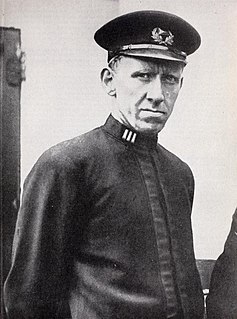A Quote by Johann Kaspar Lavater
Joy and grief decide character. What exalts prosperity? what imbitters grief? what leaves us indifferent? what interests us? As the interest of man, so his God - as his God, so he.
Quote Topics
Related Quotes
God created us in joy and created us for joy, and in the long run not all the darkness there is in the world and in ourselves can separate us finally from that joy, because whatever else it means to say that God created us in His image, I think it means that even when we cannot believe in Him, even when we feel most spiritually bankrupt and deserted by Him, His mark is deep within us. We have God's joy in our blood.
"Oh, when we are journeying through the murky night and the dark woods of affliction and sorrow, it is something to find here and there a spray broken, or a leafy stem bent down with the tread of His foot and the brush of His hand as He passed; and to remember that the path He trod He has hallowed, and thus to find lingering fragrance and hidden strength in the remembrance of Him as "in all points tempted like as we are," bearing grief for us, bearing grief with us, bearing grief like us."
Who was this Man of sorrows, acquainted with grief? Who is the King of glory, this Lord of hosts? He is our Master. He is our Savior. He is the Son of God. He is the Author of our Salvation. He beckons, “Follow me.” He instructs, “Go, and do thou likewise.” He pleads, “Keep my commandments.” Let us follow Him. Let us emulate His example. Let us obey His word. By so doing, we give to Him the divine gift of gratitude.
There are two gods. The god our teachers teach us about, and the God who teaches us. The god about whom people usually talk, and the God who talks to us. The god we learn to fear, and the God who speaks to us of mercy. The god who is somewhere up on high, and the God who is here in our daily lives. The god who demands punishment, and the God who forgives us our trespasses. The god who threatens us with the torments of Hell, and the God who shows us the true path.
There are two gods. A god who casts us off because of our sins, and a God who calls to us with His love.
It is the consciousness of the threefold joy of the Lord, His joy in ransoming us, His joy in dwelling within us as our Saviour and Power for fruitbearing and His joy in possessing us, as His Bride and His delight; it is the consciousness of this joy which is our real strength. Our joy in Him may be a fluctuating thing: His joy in us knows no change.
No benefit comes from a just man's prayer if he who asks for it finds more pleasure in sin than in virtue. For Samuel mourned over Saul when he sinned, but he was not able to obtain God's mercy, for his grief was not supported by the necessary change of life on the part of the sinner. Hence God put an end to the pointless grief of His servant, saying to him, 'How long will you mourn for Saul, seeing I have rejected him from reigning over Israel?' (I Sam. 16:1).
Grief is accepting the reality of what is. That is grief's job and purpose-to allow us to come to terms with the way things really are, so that we can move on. Grief is a gift of God. Without it, we would all be condemned to a life of continually denying reality, arguing or protesting against reality, and never growing from the realities we experience.
By His gracious condescension God became man and is called man for the sake of man and by exchanging His condition for ours revealed the power that elevates man to God through his love for God and brings God down to man because of His love for man. By this blessed inversion, man is made God by divinization and God is made man by hominization. For the Word of God and God wills always and in all things to accomplish the mystery of His embodiment.
The difference between shallow happiness and a deep, sustaining joy is sorrow. Happiness lives where sorrow is not. When sorrow arrives, happiness dies. It can't stand pain. Joy, on the other hand, rises from sorrow and therefore can withstand all grief. Joy, by the grace of God, is the transfiguration of suffering into endurance, and of endurance into character, and of character into hope--and the hope that has become our joy does not (as happiness must for those who depend up on it) disappoint us.
The goal of faithfulness is not that we will do work for God, but that He will be free to do His work through us. God calls us to His service and places tremendous responsibilitie s on us. He expects no complaining on our part and offers no explanation on His part. God wants to use us as He used His own Son.





































